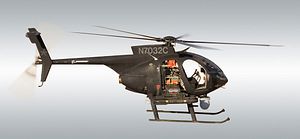The South Korean aircraft manufacturer, Korean Air Aerospace Division (KAL-ASD), has showcased a full-sized mockup of an unnamed variant of the U.S.-made MD 500 light attack helicopter at this year’s Seoul International Aerospace & Defense Exhibition, Flight Global reports.
The MD 500 unmanned model, designated KUS-VH, seen at the exhibition is armed with two Lockheed Martin AGM-114 Hellfire air-to-surface missiles and a pod of 2.75 inch-diameter rockets . It also has all of its windows blackened out.
According to Flight Global, the KUS-VH will develop two prototypes and the first flight test is scheduled for this month.
The KUS-VH is the result of extensive technological cooperation between Boeing and KAL-ASD, as part of the former’s offset obligation after Seoul decided to purchase 36 AH-64E Apache attack helicopters in 2013.
In 2013, Boeing and KAL-ASD signed a memorandum of understanding to convert the South Korean military’s fleet of MD 500 light attack helicopters into unmanned aerial vehicles (UAVs). In December 2012, Boeing offered a first flight demonstration of an unmanned MD 500 at the Republic of Korea Army (ROKA) flight school in Nonsan. However, no contract has been signed to date.
South Korea plans to retire its MD 500 fleet of 175 light attack helicopters—130 scout and 45 light-attack aircraft—over the next ten years. Yet, instead of scrapping the helicopters, converted KUS-VHs would provide the South Korean military’s new AH-64E Apache gunships “with a tailor-made [and cheap] scout UAV without the expense and burden associated with introducing an entirely new aircraft type into service,” according to IHS Jane’s Defense Weekly.
Equipped with a so-called manned-unmanned teaming (MUM-T) capability, the AH-64E Apaches’ slated to be delivered to South Korea will already come equipped to control the sensors and weapon systems of UAVs.
Furthermore, next to not putting pilots into harm’s way, the advantages of UAVs are manifold. For example, “one key modification for the unmanned KUS-VH is the addition of a large fuel tank in what ordinarily would be the area occupied by rear seats. KAL-ASD says this increases the aircraft’s endurance to 4h, compared with 2h for the manned version of the MD500, Flight Global notes. Since the KUS-VH is pilotless the average costs for each flight would also be substantially reduced.
The South Korean government has not made an official decision over the conversion of its MD 500 fleet. However, tests will proceed in the next two years. “The first of these will see the aircraft’s basic flight performance tested, and the second will involve the design undergoing simulated missions. The last phase will see weapons employed,” according to Flight Global.

































